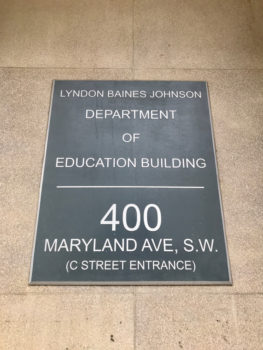 DC Shuttle …
DC Shuttle …
U.S. Education Department Eases Regulations as Colleges Move to Online Learning. A new guidance document released by the Department of Education granted “broad approval” to schools as they transition to digital learning amid the spread of the novel coronavirus (COVID-19). Per the document, the department will still allow schools to qualify for Federal Work Study and Pell Grant funds, despite many students being told to leave campus. Study-abroad programs and class cancellations were some of the other issues colleges are facing that were addressed in the document. Sen. Patty Murray (D-WA), ranking member on the Senate Health, Education, Labor, and Pensions (HELP) Committee, unveiled a $2.7 billion emergency funding bill to minimize the fallout of the virus on school campuses. Education Dive and the New York Times report.
Congressional Democrats Demand Guidance from Education Department in Wake of COVID-19. In their second letter to U.S. Education Secretary Betsy DeVos in two weeks, Senate Democrats continued their pressure on the department to provide “clear guidance and direction” as schools across the country close over COVID-19 concerns. The first letter, sent on March 2 by Democrats on the Senate HELP Committee, demanded answers on the department’s broad response to the virus. Senators in the new letter asked for clarity on issues such as school lunch programs, access to computers and internet for students, mental health services and more. Rep. Rosa DeLauro (D-CT) wrote her own letter to DeVos expressing concern that the department’s response leaves out students with disabilities.
Department of Labor Issues New Rule to Grow Apprenticeships. The U.S. Department of Labor issued regulations that establish a new system to evaluate apprenticeships. The system creates Industry-Recognized Apprenticeship Programs (IRAPs) to increase apprenticeships in industries that traditionally have fewer opportunities, such as healthcare and cybersecurity. IRAPs will allow third-party groups, such as colleges, trade associations and nonprofits, to develop and recognize programs in their own industry. House and Senate Democrats criticized the reforms as a missed opportunity to improve the existing infrastructure within the Labor Department. Read more in Education Dive.
Senate Votes to Overturn Changes to Borrower Defense Rules. The Senate voted 53 to 42 to advance a resolution (S.J.Res 56) that would reverse the Department of Education’s proposed changes to the 2016 “borrower defense” rule. The changes overturned by the bill would have made it more difficult for students who claim to have been deceived by their school to have loans forgiven. Ten Republican senators joined Democrats to pass the resolution, which was first introduced in the House in January. It now goes to the desk of the president; a Statement of Administration Policy released in February warned that the president’s advisors would recommend he veto it. CNN and The Hill have more.
House Passes Bill to Provide Student Loan Forgiveness to Disabled Veterans. The House voted to pass the FREED Vets Act (H.R. 3598), a bill that would automatically discharge federal student loan debt for eligibly permanently disabled veterans. Current regulation requires eligible veterans to apply for forgiveness. The rule change would discharge the loans of the remaining 25,000 eligible veterans without their applying. The passage of the bill comes after President Trump, by executive order, announced plans to forgive the debt owed by these borrowers in August 2019. The Intelligencer and Inside Higher Ed report.
We publish the DC Shuttle each week featuring higher ed news from Washington collected by the New England Council, of which NEBHE is a member. This edition is drawn from the Higher Education Update in the Council’s Weekly Washington Report of March 16, 2020. For more information, please visit: www.newenglandcouncil.com.
[ssba]
